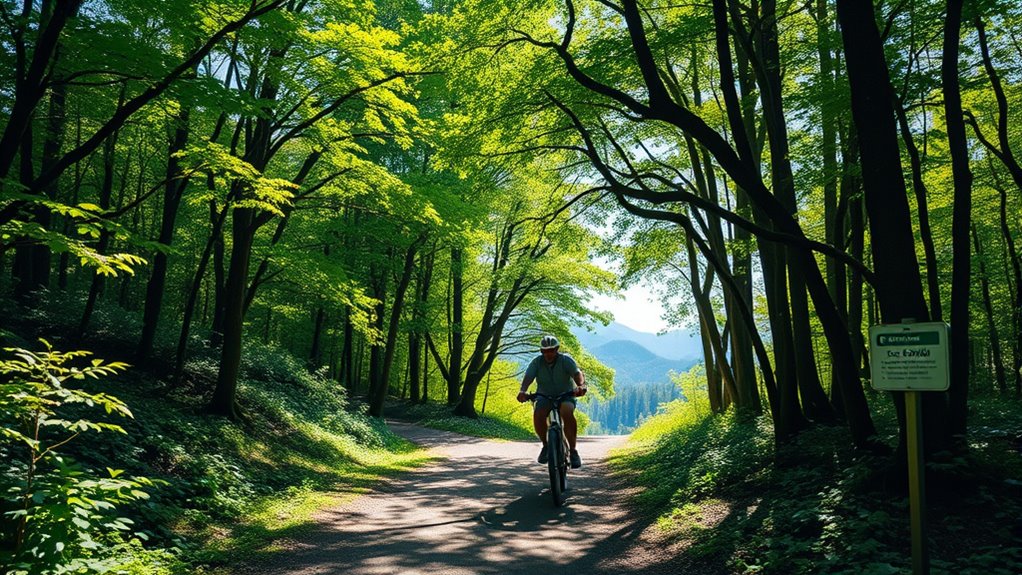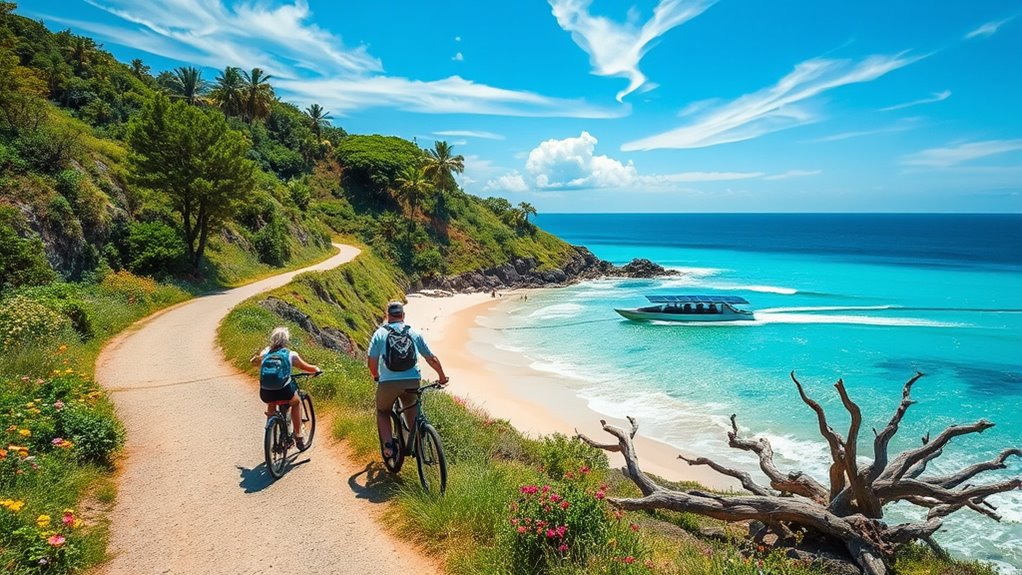To lower your carbon footprint on vacation, choose eco-friendly accommodations that use sustainable practices like solar energy and water conservation. Opt for eco tours that support conservation and local communities. Use public transportation, walk, or bike instead of flying or driving alone. Limit plastic waste and source local products to decrease environmental impact. Making these responsible choices not only helps protect the planet but also enriches your travel experience. Continue to explore more ways to travel sustainably.
Key Takeaways
- Choose eco-friendly accommodations that prioritize energy efficiency, water conservation, and waste reduction.
- Opt for sustainable transportation options like trains, buses, biking, or walking instead of flying.
- Support local businesses, community-led tours, and eco-conscious experiences that benefit the environment and local culture.
- Reduce plastic waste, conserve water, and source local products to minimize your environmental impact during travel.
- Participate in conservation efforts and responsible tourism practices to protect ecosystems and cultural heritage.

Have you ever wondered how your travel choices impact the planet? Every decision you make—from how you get there to where you stay—can influence the environment. One of the best ways to reduce your carbon footprint while exploring new places is by choosing eco friendly accommodations. These hotels and lodges prioritize sustainability by implementing energy-efficient systems, solar power, water conservation practices, and waste reduction programs. By staying in such places, you support businesses committed to protecting the environment rather than exploiting it. It’s a simple yet powerful step toward responsible tourism, which means traveling in a way that minimizes negative impacts and benefits local communities.
Opting for eco friendly accommodations isn’t just about the building’s green features; it’s also about aligning your entire trip with sustainable principles. Many eco accommodations promote local culture and support community projects, ensuring your tourism dollars help improve the area rather than drain its resources. This approach encourages you to be more mindful of your consumption, reducing plastic waste, conserving water, and opting for locally sourced products. In doing so, you’re actively participating in responsible tourism, which emphasizes respect for the environment, local traditions, and residents.
To further lower your travel footprint, consider how you get to your destination. Whenever possible, choose trains, buses, or carpooling instead of flying, since air travel is one of the largest contributors to carbon emissions from tourism. Once there, explore options like biking, walking, or using local public transportation. These methods not only cut emissions but also allow you to immerse yourself more deeply in the local culture. It becomes less about rushing from one tourist spot to another and more about engaging meaningfully with your surroundings.
When planning activities, seek out eco-friendly tours and experiences that prioritize conservation and community benefit. For example, wildlife sanctuaries that focus on rehabilitation rather than exploitation or community-led tours that support local artisans and entrepreneurs. Always remember, responsible tourism involves respecting the environment and local customs, avoiding activities that could harm ecosystems or exploit vulnerable populations.
Ultimately, your choices can make a significant difference. Small actions—like staying in eco friendly accommodations, choosing sustainable transportation options, and participating in responsible tourism—add up to a meaningful reduction of your carbon footprint. Traveling consciously isn’t about sacrificing comfort or adventure; it’s about making smarter, more responsible decisions that help preserve the planet for future generations. By doing so, you turn your vacation into an opportunity not just to explore, but to contribute positively to the places you visit. Engaging with sustainable business practices like these enhances your travel experience and helps ensure that natural and cultural treasures endure for years to come.

Orkney Islands Travel Guide 2026: Discover Scotland’s Northern Gem From Ancient Stones to Wild Shores and Experience Authentic Orkney Through Food Festivals Walking Tours and Coastal Trails
As an affiliate, we earn on qualifying purchases.
As an affiliate, we earn on qualifying purchases.
Frequently Asked Questions
How Can I Measure My Travel Carbon Footprint Accurately?
To measure your travel carbon footprint accurately, start with a carbon footprint calculation tool or app that considers your transportation mode, distance, and accommodation choices. Conduct a travel impact assessment by tracking your flights, car rides, and hotel stays. These tools help you understand your overall emissions, so you can identify areas to reduce and make more sustainable travel decisions. Always update your data for the most precise results.
Are There Specific Certifications for Eco-Friendly Accommodations?
Yes, you can look for eco labels and certification standards when choosing accommodations. These eco labels, like Green Key or LEED, guarantee the property meets specific sustainability criteria. Certification standards verify that the hotel or lodge actively reduces its environmental impact through energy efficiency, waste reduction, and water conservation. By choosing places with recognized eco labels, you support eco-friendly practices and make your travel more sustainable.
What Are the Best Low-Impact Transportation Options?
They say “every little bit helps,” and choosing low-impact transportation can make a big difference. You can rent electric bikes to explore sustainably and reduce emissions. Carpooling options also cut your carbon footprint and can be a fun way to meet locals or fellow travelers. These eco-friendly choices not only help the planet but also enhance your travel experience, making it more meaningful and responsible.
How Can Local Communities Benefit From Sustainable Tourism?
You can help local communities benefit from sustainable tourism by supporting community empowerment initiatives and choosing activities that promote cultural preservation. When you engage with local artisans, stay in community-run accommodations, and participate in cultural experiences, you directly contribute to economic growth and social well-being. Your mindful choices guarantee that tourism helps preserve the community’s identity and traditions, creating lasting positive impacts for residents and future visitors alike.
What Are Common Misconceptions About Eco-Friendly Travel?
Many believe eco-friendly travel always means sacrificing comfort or cost, but that’s a misconception. You might fall for eco label confusion, thinking all green labels guarantee sustainability, which isn’t true. Be cautious of greenwashing pitfalls where companies claim to be eco-friendly without real efforts. Instead, research credible certifications and prioritize genuine sustainability practices to truly lower your carbon footprint and support responsible tourism.

Eagle Creek Pack-It Isolate Quick Trip – Compact Travel Toiletry Bag for Optimizing Luggage Space – Lightweight – Water-Resistant – Easy-Grab Zipper – Sustainable Materials – X-Small – Black
Compact Travel Toiletry Bag: The Eagle Creek Pack-It Isolate Quick Trip features a long zippered compartment and zippered…
As an affiliate, we earn on qualifying purchases.
As an affiliate, we earn on qualifying purchases.
Conclusion
By choosing eco-friendly travel habits, you’re not just exploring new places—you’re helping preserve them. Think of your journey as tending a garden; each mindful decision, like reducing waste or opting for green transportation, nurtures the environment. For instance, one traveler reduced her carbon footprint by 30% simply by walking more and avoiding flights. Just as a small seed grows into a thriving plant, your conscious choices can make a meaningful difference—so keep planting those sustainable habits on every trip.

Wolf Tours (Eco Poetry)
As an affiliate, we earn on qualifying purchases.
As an affiliate, we earn on qualifying purchases.

BEAUTAIL Collapsible Water Bottles 20.6oz, Silicone Foldable Portable Travel Water Bottle, BPA-Free, Leakproof Reusable for Traveling Camping Hiking Cycling Yoga Sports Outdoor, 1 Pack (Dark Blue)
COLLAPSIBLE & SPACE-SAVING FOR EASY CARRYING: This 20.6 fl oz (610 ml) foldable water bottle easily expands when…
As an affiliate, we earn on qualifying purchases.
As an affiliate, we earn on qualifying purchases.









